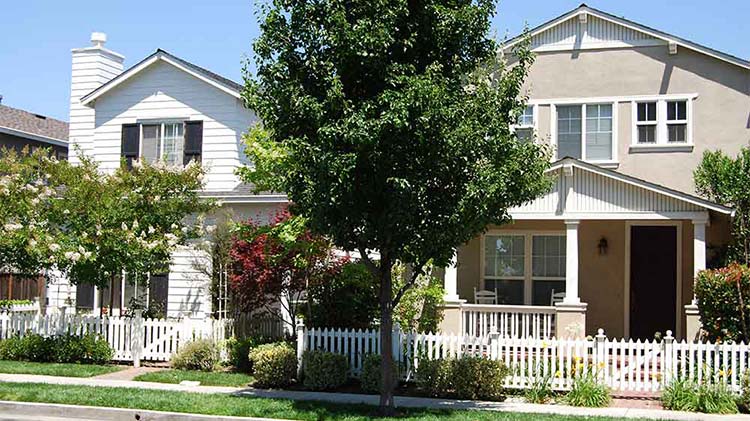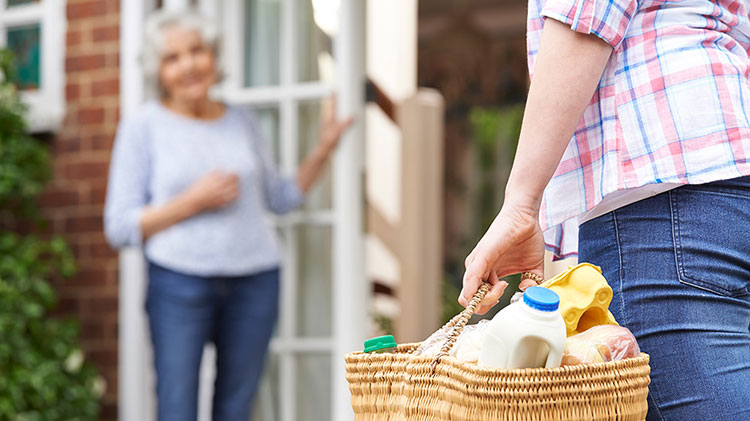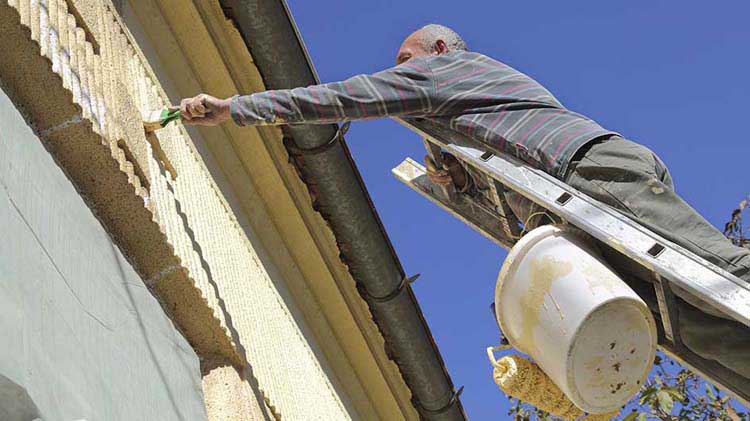How to be a good neighbor
What's OK to share — and what might lead to neighbor disagreements? Read on for ideas to avoid property line disputes, build bonds and maintain community.
Whether you own a home or rent, we all borrow the proverbial cup of sugar from our neighbors from time to time. Whether we need a jumpstart, a socket wrench or someone to water our plants while we're away, sometimes we need to ask for help.
Being a good neighbor means it's important to reciprocate and find your own ways to share, but it's also necessary to protect your home and set appropriate boundaries so that you don't have property line disputes. Knowing what your homeowner's or renter's insurance coverages are is also important. These simple scenarios may help you create your own boundaries and share ideas for great neighbor relationships.
Can my neighbor build a fence on the property line?
According to the old saying, good fences make good neighbors. But it's perhaps equally true that good neighbors make good fences. It's better to communicate about fence construction beforehand than to deal with an argument (or even a legal dispute) afterward. In some communities, fences can be built directly on your property line, with both neighbors sharing the cost and the responsibility of maintaining the fence over time, making it doubly important to proactively partner with your neighbor. If a neighbor builds the fence entirely on his or her own property, they won't need to agree on costs or design with you, but it's standard fence etiquette to face the "good" side of the fence (the one without the rails and posts) toward the neighbor's property.
What about the unsightly yard and house?
Keeping your property and curb tidy is a responsibility of being part of a community, a property owner and a good neighbor. It means doing your best to keep it clean and appealing. Many neighborhoods have that "one house"that has overgrown grass, peeling house paint, messy bushes, overflowing gutters and is simply an eyesore.
Unfortunately, just one home in the community can affect property values for an entire neighborhood. Make sure you clean up the front of your property and house as much as you can. If you have the ability, consider offering to help your neighbors when you see something that needs to be cleaned up. Also, it is always nice to help out if your neighbors are elderly, disabled, out of town or ill. They may return the favor sometime.
What about neighborhood animals or pets?
Being a responsible neighbor and pet owner is important. Unfortunately, not all people are responsible pet owners, and it can become an issue. Occasionally, a neighborhood pet may wander off or come into your yard. Carefully contain or leash the animal, if you determine it is safe to do so, and try to contact the pet owner. If your pet gets loose or is lost, alert your neighbors to be on the lookout.
When letting pets out or walking them, always restrain them and clean up after them. It helps to use the right leash or harness when walking dogs. Even if your dog is well-behaved without a leash, other dogs may react aggressively to an unleashed dog. Always use precautions and be aware of your environment.
Be cautious when approaching animals so as to not get bitten or do anything that may encourage aggression. If you see a pet that is acting strange or appears to be a stray, call your local animal control. Accidents involving pets and bites do happen. They occur even with the most responsible pet owners and in the safest of neighborhoods. Make sure you check your liability coverage. Also, make sure you have an emergency kit handy and know what to do, just in case.
What about sharing tools with a neighbor?
Borrowing and sharing tools is part of being a good neighbor. If your next-door neighbor can't find his Phillips-head screwdriver and needs to borrow yours, that would be a nice gesture. But it's probably not a great idea to start lending (or borrowing) more expensive equipment. Sharing large items like this can create the sense that you'll always lend things out and can also reduce the lifespan of your large purchases or increase the risk of breaking a spendy item. If a neighbor has a lawnmower in the shop, you might make an exception (or, in a good-will gesture, give their yard a quick trim when you're out doing your own). But otherwise, your neighbors should be responsible for buying and maintaining their own equipment.
Who is responsible for cutting overhanging tree branches?
My neighbor's tree is beautiful — and it arches beautifully across my backyard. I think it needs trimming. Who is responsible?
Ahh, you're talking about air rights, one of the most interesting things about owning property and sharing boundaries with neighbors. The branches that extend over your yard are in your air space, so if you're worried about them or see a dead branch, you may certainly have it trimmed. However, it's best to talk about your concerns with your neighbor. Perhaps they've noticed branches in their yard that need trimming, too, and you can come to an agreement to split any bills.
What if I have a noisy neighbor?
For starters, reach out to them in person. They may not realize that the noise is bothersome or that your walls are not as insulating as they might have thought.
For renters, if that doesn't work, contact the landlord or property owner with documented instances to find out next steps. For homeowners with loud neighbors, reach out politely and explain that the music or noise carries and why you would like it stopped. Normally just talking about it works.
Should I let neighbors borrow my Wi-Fi?
In a world where connectivity is everything, it's a good idea to keep any tech access private and secure. A guest network on your own router will keep neighbors from infecting your data and devices if they are hacked. To prevent neighbors from permanently accessing your Wi-Fi, you can occasionally change the password.
What makes for great neighbor sharing?
A few ways to be a great neighbor are to help shovel snow, help clean yards, host a neighborhood cookout or participate in clean-up day. You could build a free library or book share box in your front yard. Gardening is another great way for neighbors to work together to create, keep, grow and harvest a bountiful community garden. If you have a garden, consider offering surplus to families in your neighborhood. There are so many practical and simple ways to give back to your community and build workable relationships.
Always make sure you review your insurance coverage and personal liability protection. Contact your agent if you have questions.




